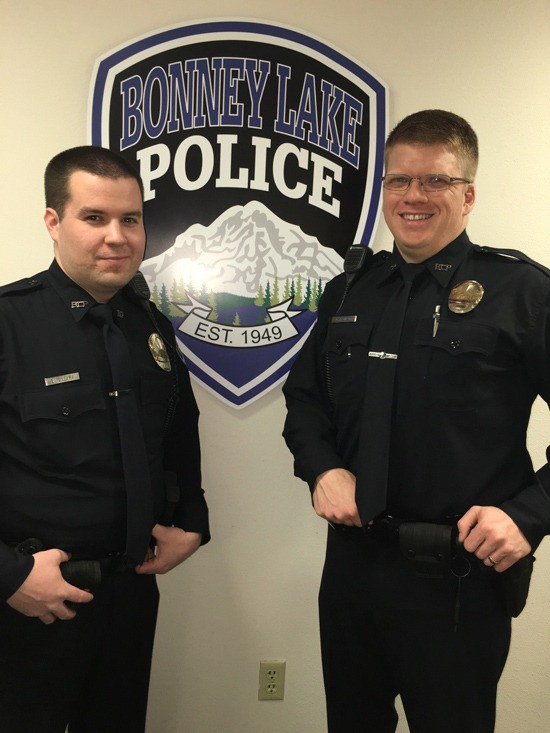Ever since his mother started working with the Redmond Police Department, Officer Justin Paulson knew he wanted to be an officer of the law.
Going on ride-alongs with officers in middle school and attending Bellevue Police Department’s first ever Citizen’s Academy further cemented his future.
Paulson’s education took him through Washington State University and received a degree in business administration and management information services (“I’m actually a computer nerd,” Paulson said) before he applied for an open reserve officer position in Bonney Lake.
It’s been almost a year since Paulson graduated from the Police Academy, and he is an active member of the Bonney Lake Police Department.
“It’s actually a lot of fun,” Paulson explained. “There’s a lot of training involved… but for me, this is a way to give back to the community and spend time with really good people.”
Paulson and Officer Ben O’Leary make up the grand total Bonney Lake’s reserve officers, with Officer Nate Alvord having been hired into the force as a Community Service Officer January 2015 after three years on the force as a reserve officer.
Paulson and O’Learny were recognized for their work by the city of Bonney Lake on Jan. 29, 2016.
What is a reserve officer?
There are few differences between reserve officers and the rest of the force – the training is just as intense, physically and mentally, and reserve officers go out on patrol, perform traffic stops and make arrests, although under the supervision of a field training officer.
“They participate in all the stuff we do,” said Sgt. Ryan Boyle.
One of the biggest differences is reserve officers are not compensated financially for the work they put into the force. So on top of being a reserve officer, Paulson works full time in Bellevue and O’Leary holds down a job in Sumner.
Boyle said juggling a job and spending your free hours as a reserve officer is a good way to be noticed, and eventually hired, by police departments. In fact, around 85 percent of the Bonney Lake police force started out as reserve officers.
That may be one reason why Paulson feels so at home with the Bonney Lake Police Department.
“I’m very welcome,” he said. “Everybody who works here, they treat me very well.”
How do you become a reserve officer?
Training to become a reserve officers is expensive in regards to both money and time management.
Before citizens can even start, they’ve got to find a police department to sponsor them through the academy.
The vetting process is intense, Boyle said. Last year, despite numerous applications, the Bonney Lake Police Department did not sponsor any citizens through academy, although they received many applications.
First comes the physical and written exams, Paulson said, and then comes the interview board, background checks, polygraphs, psychological evaluations and a doctor’s physical exam.
“Everything a full time officer gets checked for, we get checked for as reserves,” he explained.
Paulson said it was the polygraph test was the most nerve wracking for him.
“Not that I have anything to hide, and I passed it… but still, you’re hooked up to something that you can see out of the corner of your eye and the polygraph administrator staring at the screen going, ‘Hmmmmm,’ and it makes you start questioning,” he said. “When I was done I left a nice huge puddle of sweat. But I passed.”
After getting through the vetting process, Paulson’s time at the academy was paid by the Bonney Lake Police Department.
Academy for reserve officers means attending three to four classes a week and reach more than 320 academy hours.
A reserve officer’s firearm and radio also comes from the department, but the cost of everything else – the uniform, the belt and other gear – is put squarely on the shoulders of the reserve officer.
Once academy is over, reserve officers are expected to work a minimum of 20 hours a month until they achieve more than 500 hours working with a field training officer.
Working the minimum would take just over two years to complete, but this is time well spent hammering the training into habit.
“From start of the day to the end of the day, you’re using all of your training combined together to make sure you’re safe and the officers you work with stay safe,” O’Leary said, who is close to being tested for becoming a full time officer.
Bonney Lake reserves
Just in the past few weeks, Boyle learned the police academy moved its start time up from November to September, meaning reserve officer applicants must apply for the position as soon as possible.
“We don’t have a whole lot of time,” Boyle said. “We are hoping to get one or two… I’d even bring on three more, if we could.”
“But the process is lengthy, extensive. And it needs to start right away,” he continued.
The BLPD is aiming to accept applications through mid-May, and plans to start the vetting process as soon as applicants walk through the door.
Citizens who want to apply to become a reserve officers can download an application form online or pick one up at the Bonney Lake Justice and Municipal Building.
Questions can be directed to Boyle at 253-863-2218.


